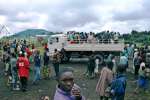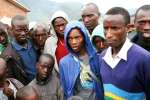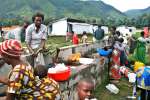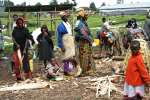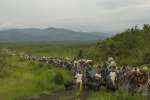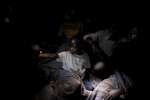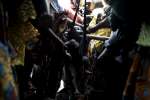UNHCR warns of urgent need for sites to host DRC refugees in ROC and CAR
Briefing Notes, 12 January 2010
This is a summary of what was said by UNHCR spokesperson Andrej Mahecic – to whom quoted text may be attributed – at the press briefing, on 12 January 2010, at the Palais des Nations in Geneva.
More than 107,000 Congolese refugees from the Democratic Republic of Congo (DRC) have now fled to the Republic of Congo (ROC) since early November. Another 17,000 refugees have crossed into the Central African Republic (CAR). In CAR we estimate that at least 60 per cent are children, many of whom fled from orphanages.
They fled from the Equateur province of north-west DRC after fighting started in late October when Enyele militiamen launched deadly assaults on ethnic Munzayas over fishing and farming rights in the Dongo area. The tensions have since expanded to most parts of Equateur province. The DRC army has launched an offensive against the Enyele militia.
There is an acute need for formal refugee sites to be established in both CAR and ROC, as the majority of the DRC refugees occupy public buildings and spaces. This massive influx is severely stretching the meager resources of this impoverished region, which could lead to tensions with the local community. In Mougoumba in CAR the refugees outnumber the locals by 200 to one, while the Likouala region of northern ROC has seen its population double with the arrival of 107,000 refugees.
Although land has been allocated to accommodate 4,000 refugees in ROC, more space needs to be designated for refugee sites and discussions are ongoing with both ROC and CAR governments. Meanwhile UNHCR has sent emergency staff to support the widely dispersed refugee communities in this region.
Make a gift now to help protect and assist those fleeing violence in Central African Republic.
Donate to this crisis
Intense fighting has forced more than 64,000 Congolese to flee the country in recent months.
Donate to this crisis
Congolese Refugees flee to Rwanda
In the first ten days of May 2012, more than 6,500 refugees from the Democratic Republic of the Congo crossed into Rwanda, fleeing fighting between the Congolese army and renegade soldiers. UNHCR and its UN partners worked with the Rwandan government to provide the refugees with humanitarian assistance in the early stages of the crisis, and to find solutions until it is safe for them to return.
Some of the refugees walked for days before reaching the Goma-Gisenyi border crossing between Democratic Republic of the Congo and Rwanda. They came with their belongings, including mattresses, clothing, perhaps a few toys for the children. The images are from the border and from the Nkamira Transit Centre, located 22 kilometres inside Rwanda. Accommodation at Nkamira is poor: the centre can only host up to 5,400 individuals. It is only temporary shelter, but numbers continue to swell as hundreds cross the border every day.
Congolese Refugees flee to Rwanda
UNHCR/Partners Bring Aid to North Kivu
As a massive food distribution gets underway in six UNHCR-run camps for tens of thousands of internally displaced Congolese in North Kivu, the UN refugee agency continues to hand out desperately needed shelter and household items.
A four-truck UNHCR convoy carrying 33 tonnes of various aid items, including plastic sheeting, blankets, kitchen sets and jerry cans crossed Wednesday from Rwanda into Goma, the capital of the conflict-hit province in eastern Democratic Republic of the Congo (DRC). The aid, from regional emergency stockpiles in Tanzania, was scheduled for immediate distribution. The supplies arrived in Goma as the World Food Programme (WFP), with assistance from UNHCR, began distributing food to some 135,000 displaced people in the six camps run by the refugee agency near Goma.
More than 250,000 people have been displaced since the fighting resumed in August in North Kivu. Estimates are that there are now more than 1.3 million displaced people in this province alone.
Posted on 6 November 2008
UNHCR/Partners Bring Aid to North Kivu
UNHCR/Partners Bring Aid to North Kivu
Since 2006, renewed conflict and general insecurity in eastern Democratic Republic of the Congo's North Kivu province has forced some 400,000 people to flee their homes – the country's worst displacement crisis since the formal end of the civil war in 2003. In total, there are now some 800,000 people displaced in the province, including those uprooted by previous conflicts.
Hope for the future was raised in January 2008 when the DRC government and rival armed factions signed a peace accord. But the situation remains tense in North Kivu and tens of thousands of people still need help. UNHCR has opened sites for internally displaced people (IDPs) and distributed assistance such as blankets, plastic sheets, soap, jerry cans, firewood and other items to the four camps in the region. Relief items have also been delivered to some of the makeshift sites that have sprung up.
UNHCR staff have been engaged in protection monitoring to identify human rights abuses and other problems faced by IDPs and other populations at risk across North Kivu.
UNHCR's ninemillion campaign aims to provide a healthy and safe learning environment for nine million refugee children by 2010.
Posted on 28 May 2008
UNHCR/Partners Bring Aid to North Kivu


Cameroon: Central African Republic Refugees Register to Vote
Salihu Hassan, 57, from the Central African Republic may be a refugee now but he still wants to have a say in elections planned for December 27.


Central African Republic: Displaced at Home
The Central African Republic has been marred by conflict since December 2013, displacing more than 830,000 people. More than half are refugees. As a fragile peace begins to take hold, thousands of people are returning to CAR. Many, however, still face further displacement at home.


The Central African Republic Crisis: Hardship and Resilience
As the conflict drags on in CAR, the UN refugee agency and its partners appeal for more support to help over 425,000 refugees in four neighbouring countries.




